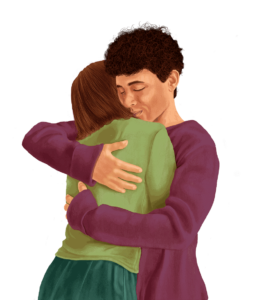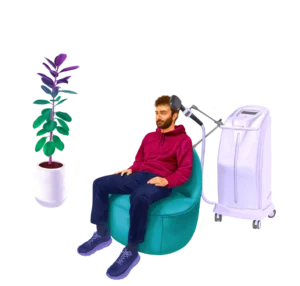Most of us are raised to be independent. We’re told to think for ourselves, to not rely on others,and that you have to look out for yourself. When it comes to your mental health, taking care of things by yourself can lead to self-medicating. One drink or one pill to sleep or relax or to conquer your social anxiety can lead to two, and two can lead to three. Self-medicating can lead you down a slippery slope that can be difficult to find your way off of on your own. In fact, 51 percent of people with a substance abuse disorder also showed symptoms of a mental health disorder. Most of them reported the mental health issues started before the substance abuse problem.
Are you concerned that you or someone you love is self-medicating with drugs or alcohol? Keep reading to learn more about what self-medicating is, how the different types can affect us, and how to get help.
What is self-medicating?
In 1985, a hypothesis was released that stated people respond to mental illness with drugs, alcohol, and other dangerous substances. This hypothesis is at the core of what self-medicating is. When you consistently use prescription or recreational drugs or alcohol to dull or hide feelings, such as anger, anxiety, and depression, you’re self-medicating.
While the substances temporarily alter your state of mind and numb you to the feeling, many studies show that self-medicating can worsen symptoms of mental health issues like anxiety.
How to tell if you’re self-medicating
If you suspect that you might be self-medicating to avoid dealing with difficult emotions, or that a friend or family member of yours is self-medicating, ask yourself the following questions:
- What motivates me to drink or take prescription or recreational drugs?
- Is my use of alcohol or prescription or recreational drugs negatively affecting my life?
- Do I turn to drugs or alcohol when I’m feeling stressed, depressed or anxious?
- Do I feel worse after the initial effects of the drugs or alcohol wear off?
- Am I finding that it takes more self-medicating to find the same relief?
If you answered ‘yes’ or ‘I’m not sure’ to any of these questions, it might be time to talk with a licensed therapist who can help determine if you are suffering from addiction and if any mental health issues are contributing to your addiction that they can help you cope with.
Self-medicating with Marijuana
Did you know that cannabis is the most widely used substance for those with depression? This is done without peer-reviewed studies to back up any claims that cannabis benefits depression. In fact, too much cannabis in your body can worsen symptoms of depression.
While there are many different brands ofcannabis-based products on the market touting everything from balancing hormones to shifting your mood, users should be very cautious of what prescription and over-the-counter medications they are combining with marijuana use. Studies have shown different negative effects of CBD or THC in marijuana affecting the effectiveness of medications. For example, CBD has been shown to inhibit the liver’s ability to metabolize Xanax, Valium, and other benzodiazepines leading to overdose or increased sedation. The body’s ability to process Lipitor, a popular cholesterol medication, has also been shown to change. Marijuana has also been shown to speed up the metabolism of antidepressants.
One thing is certain, if you’re taking prescription medications, self-medicating with CBD or marijuana can have dangerous side effects.
Self-medicating with Prescription and Recreational Drugs
Whether you’re using prescription drugs like Vicodin, Oxycontin, or Percocet or recreational drugs like heroin, it can have serious consequences when combined with prescription medications and mental health conditions.
Drugs that lead to the feeling of euphoria, like cocaine, are both highly addictive and worsen symptoms of depression—especially during the crash. They can also cause physical health symptoms such as strokes or sudden heart failure due to their effect on the cardiovascular system.
Opiates, the top addictive prescription drug class, and heroin, are often used to self-medicate for depression. In 2013, more than 40 million people worldwide were estimated to be using opiates and opioids. Self-medicating with opioids for depression can lead to overdose as the body requires more and more medication to achieve the same high. When mixed with prescription drugs, people with addictions risk extremely slowed breathing, decreased heart rate, and even death.
Self-medicating with Alcohol
Alcohol is sometimes used to relieve symptoms of anxiety, depression, social anxiety, and more. But using alcohol rarely alleviates the underlying symptoms causing these mental health concerns. While having an occasional drink here or there is ok, using alcohol regularly can lead to an alcohol addiction. Alcohol addiction often worsens anxiety and depression symptoms, and recovery from itis a lifetime journey.
Studies have shown several factors are prevalent in higher alcohol consumption. The first is that persons who have PTSD or past trauma are likely to abuse alcohol. Another study reported heavy alcohol use was higher among those who do not use mental health care resources. While there is often a cultural stigma placed on seeking help for mental health concerns and coping with difficult emotions, breaking that stigma to seek treatment is important for both your physical and mental health.
Most doctors will let you know when not to mix certain prescription drugs with alcohol use. However, over-the-counter medications can have similar negative effects. So, make sure that you ask your doctor or the pharmacist or read the medication insert to check if the drug has been shown to react negatively with alcohol. Risks include memory problems (like blackouts), liver damage, fainting, increased heart rate, and even overdose.
Whether you use alcohol sparingly or are suffering from an alcohol addiction, it is important to be mindful of the effects alcohol can have on other drugs and your body.
Maybe you started self-medicating with alcohol or drugs unconsciously, or you were aware that’s what you were doing. Either way, seeking treatment for drug or alcohol addiction and underlying mental health concerns can help increase your likelihood of success in recovery.
Take the first step by reaching out to learn about what treatment programs are available. Core Recovery offers the top addiction treatment options in a judgment-free setting. Our goal is to help you take control over your life for the long term.




